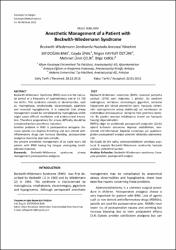Anesthetic management of a patient with beckwith-wiedemann syndrome
Abstract
Beckwith-Widemann Syndrome (BWS) occurs in the neonatal
period at a frequency of approximately one in 13 700
live births. This syndrome consists of abnormalities, such
as; macroglossia, omphalocele, visceromegaly, gigantism
and neonatal hypoglycemia. It is expected that airway
management would be complicated by macroglossia which
might cause difficult ventilation and endotracheal intubation.
Therefore preparations for airway difficulty should be
considered before anesthesia induction.
Another problem in BWS is postoperative analgesia. Because
opioids can depress breathing and non steroid antiinflammatory
drugs can increase bleeding, postoperative
analgesia should be planned carefully.
We present anesthetic management of an eight years old
patient with BWS having big tongue undergoing tonsiladenoid
resection. Beckwith-Widemann sendromu (BWS) neonatal periyotta
yaklaşık 13700 canlı doğumda 1 görülür. Bu sendrom
makroglossi, omfalosel, viseromegali, gigantism, neonatal
hipoglisemi gibi birçok anomaliler içerir. Havayolu yönetimini makroglossinin sebep olabileceği zor ventilasyon ve
endotrakeal entubasyonun komplike hale getirmesi beklenir. Bu yüzden anestezi induksiyonu öncesi zor havayolu
hazırlığı düşünülmelidir.
BWS’da diğer bir problemde postoperatif analjezidir. Çünkü
opioid kullanımı solunumu deprese edebilkirken, nonsteroid antiinflamatuar ilaçlarda kanamaya yol açabileceğinden postoperatif analjezi yönetimi dikkatlice planlanmalıdır.
Biz büyük bir dile sahip, adenotonsillektomi ameliyatı yapılacak 8 yaşında Beckwith-Widemann sendromlu hastada
anestezi yönetimini sunduk
Source
Afyon Kocatepe Üniversitesi, Kocatepe Tıp DergisiVolume
14Issue
1Collections
- Makaleler [452]
- TR-Dizin İndeksli Yayınlar Koleksiyonu [241]



















